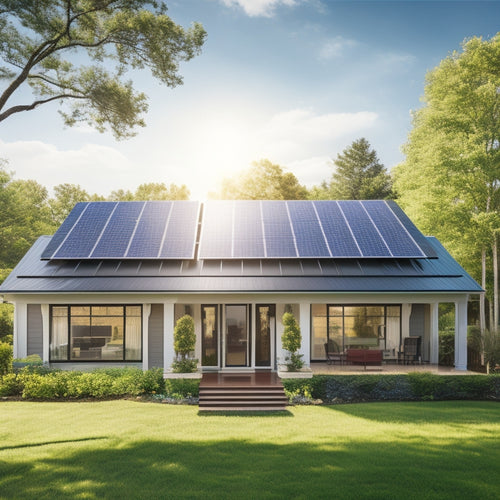
Solar Panel Storage System
Share
By investing in a solar panel storage system, you're guaranteeing renewable energy independence and control over your power supply, ensuring a reliable and sustainable source of electricity for your home or business. This setup enables you to store excess energy generated during the day for use during outages, nighttime, or peak hours, maximizing your off-peak energy savings. Deep cycle batteries play an essential role in optimizing energy storage, and evaluating your energy demands helps determine the right system size. With proper installation and maintenance, you can enjoy higher round-trip efficiency and efficient energy harvesting, and uncover more ways to optimize your system's performance as you investigate further.
The Essentials
- Solar panel storage systems provide energy independence, reducing reliance on the grid and fossil fuels, and enabling off-grid living with lower carbon footprints.
- Advanced technology in solar panels and deep cycle batteries maximizes energy harvesting and storage efficiency, ensuring a reliable power supply during outages and peak usage.
- Proper charging parameters, such as ideal voltage and current limits, are crucial for the performance and longevity of deep cycle batteries in solar panel storage systems.
- Assessing daily energy demands, including appliance usage and seasonal fluctuations, is essential for determining the appropriate size and configuration of a solar panel system.
- Higher round-trip efficiency can be achieved through efficient energy harvesting strategies, including high-efficiency solar panels, MPPT charge controllers, and high-efficiency inverters.
Renewable Energy Independence Guaranteed
With a solar panel storage system, you're in control of your energy usage, enabling you to generate and store power on your own terms.
By integrating a battery storage system into your solar setup, you'll access the full potential of renewable energy and create a more sustainable, dependable, and cost-effective power solution Energy Storage Solutions.
This means you'll have reliable power always, even during outages or peak usage periods.
Energy On Your Terms
Energy autonomy takes center stage with a solar panel storage system, allowing you to employ the power of renewable energy on your own terms. This means you're no longer beholden to the grid, with its unpredictable rate hikes and outages.
With a solar panel storage system, you're in control, generating and storing your own clean energy. Recent solar technology advancements have made it possible to control and store energy more efficiently than ever before, thanks to innovative solutions like All in One Solar Power Systems that integrate solar panels, a charge controller, inverter, and battery storage into a single, compact unit.
This, combined with favorable energy policy impacts, has made renewable energy a viable option for homeowners and businesses alike. You can rest assured that your energy needs are met, without relying on fossil fuels or the grid.
By going off-grid, you're not only reducing your carbon footprint but also your energy bills. You're free to live life on your own terms, without the burden of energy uncertainty.
With a solar panel storage system, you're the controller of your energy destiny.
Reliable Power Always
You've taken the first step towards energy autonomy with a solar panel storage system, and now you're ready to reap the benefits of reliable power always.
With a solar panel storage system, you can utilize the sun's energy during the day and store it for later use, guaranteeing a steady supply of power even when the grid goes down. This advanced technology not only provides energy independence but also safeguards your family's comfort and well-being by keeping lights, internet, and communication devices powered on Emergency Power Backup.
Additionally, it prevents costly losses due to food spoilage and damage to electronics by keeping your refrigerator and other essential appliances running during outages. This means you'll experience minimal disruptions to your daily routine, and you can continue to power your essential appliances and devices without worrying about outages.
The system's advanced technology assures high solar efficiency, allowing you to maximize your energy harvest and reduce your reliance on the grid. Plus, with a battery storage system, you can store excess energy generated during the day for use at night or during power outages, securing power reliability.
With a solar panel storage system, you'll enjoy the freedom to live life on your terms, without worrying about the uncertainty of the grid. You'll have the power to choose when and how you use your energy, giving you the independence you desire.
Say goodbye to power outages and hello to reliable power always.
Maximizes Off-Peak Energy Savings
You'll uncover that a solar panel storage system maximizes off-peak energy savings by leveraging energy storage benefits, such as renewable energy storage and battery backup systems.
By integrating these solutions, homeowners and businesses can optimize their energy usage and reduce their carbon footprint.
By storing excess energy generated during off-peak hours, you can avoid peak hour rates and reduce your overall energy costs.
This approach allows you to make the most of your renewable energy investment and minimize your reliance on the grid during peak periods.
Energy Storage Benefits
By integrating a solar panel storage system, homeowners and businesses can maximize their off-peak energy savings. This means you'll have more control over your energy usage and can optimize your energy storage when the grid connection is at its lowest rate.
With advanced battery technology, you can store excess energy generated during the day for use during peak hours, reducing your reliance on the grid and lowering your energy bills.
While installation costs may seem high, the long-term benefits and savings will outweigh the initial investment. Moreover, with proper maintenance tips, your system will last for years to come.
The environmental impact of a solar panel storage system is significant, reducing your carbon footprint and contributing to a cleaner, more sustainable future. In addition, government incentives can help offset the cost of installation, making it a more accessible option for individuals and businesses alike.
As the technology continues to evolve, system integration will become more seamless, and future trends will likely focus on increasing efficiency and reducing costs.
Peak Hour Avoidance
As the grid connection reaches its peak hours, typically between 4 pm and 7 pm, your solar panel storage system kicks in, supplying you with the stored energy generated during the day. This allows you to avoid peak hour rates and maximize your off-peak energy savings. By managing your energy consumption, you can reduce your reliance on the grid during peak hours, minimizing your solar demand and saving money on your energy bills.
| Time of Day | Energy Source | Energy Cost |
|---|---|---|
| 12 pm - 4 pm | Solar Generation | $0.00/kWh |
| 4 pm - 7 pm | Peak Hour Grid | $0.30/kWh |
| 7 pm - 12 am | Stored Solar Energy | $0.00/kWh |
| 12 am - 12 pm | Off-Peak Grid | $0.15/kWh |
Deep Cycle Battery Integration
When integrating deep cycle batteries into your solar panel storage system, you'll need to take into account the battery's life cycles, as they directly impact the system's overall performance and lifespan.
By choosing high-performance batteries, such as lithium ion batteries, you can maximize renewable energy storage and reduce reliance on the grid.
You'll also need to set the charging parameters correctly, as overcharging or undercharging can reduce the battery's lifespan.
Battery Life Cycles
Your deep cycle battery's lifespan is an essential factor in determining the overall performance and cost-effectiveness of your solar panel storage system. A well-maintained battery can last for up to 15 years, but improper use and lack of maintenance can greatly reduce its lifespan.
To optimize your battery's lifespan, you need to understand its life cycle. A deep cycle battery's life cycle is typically measured in charge and discharge cycles. A full cycle is completed when the battery is discharged to 50% of its capacity and then recharged to 100%.
You can expect your battery to last for around 2,500 to 3,000 cycles, depending on the manufacturer and quality of the battery. Proper battery maintenance is vital to extend its lifespan.
Regularly checking the battery's state of charge, voltage, and electrolyte levels can help identify potential issues early on. By adopting a proactive approach to battery maintenance, you can optimize your battery's lifespan and guarantee your solar panel storage system operates efficiently and effectively.
Charging Parameters Matter
Proper charging parameters are essential to guarantee your deep cycle battery's peak performance and longevity.
When it comes to integrating your deep cycle battery with your solar panel storage system, you must confirm that your charging parameters are fine-tuned for maximum efficiency. This means configuring your charging system to deliver the ideal voltage and current to your battery.
You'll want to focus on achieving high charging efficiency, as this will reduce energy losses and minimize the time it takes to fully charge your battery.
The ideal charging voltage for most deep cycle batteries is between 14.1 and 14.4 volts. You should also consider the charging current, which should be limited to around 10-15% of the battery's capacity to prevent overheating.
Assess Your Energy Demands
You need to determine your energy usage patterns to guarantee your solar panel storage system meets your daily power requirements.
To do this, you'll want to track how much energy you use during the day, when you use it, and what appliances or devices are consuming the most power.
For instance, you may want to contemplate investing in home battery systems that can provide backup energy during power outages.
Energy Usage Patterns
Energy usage patterns vary markedly from one household to another, depending on factors such as family size, lifestyle, and the number of energy-intensive appliances.
When evaluating your energy demands, it's crucial to understand your unique energy consumption trends. You'll want to analyze your past energy bills to identify seasonal usage fluctuations, which can greatly impact your overall energy needs. For instance, if you live in a region with harsh winters, your energy consumption will likely increase during the winter months due to heating requirements.
You should also consider your daily habits and how they influence your energy usage. Do you work from home, or are you away from home for most of the day?
Do you have energy-hungry appliances like pool pumps or electric vehicle chargers? By understanding your energy usage patterns, you'll be able to accurately determine your energy demands and design a solar panel storage system that meets your specific needs.
This will guarantee you have a reliable and efficient energy supply, giving you the freedom to live life on your own terms.
Daily Power Requirements
Daily Power Requirements (Assess Your Energy Demands)
About 80% of a typical household's daily power requirements stem from essential appliances like refrigerators, lighting, and HVAC systems. To accurately assess your energy demands, you need to understand your daily power requirements. This will help you determine the right size of your solar panel storage system.
| Appliance | Average Daily Energy Consumption (kWh) | Peak Power Rating (W) |
|---|---|---|
| Refrigerator | 1.5 | 150 |
| Lighting (10 LED bulbs) | 0.5 | 50 |
| HVAC System | 10 | 5000 |
Higher Round-Trip Efficiency
You'll want to maximize your energy harvesting efficiency to get the most out of your solar panel storage system.
This means optimizing your system's ability to convert sunlight into electrical energy and then store it for later use.
Efficient Energy Harvesting
As the solar panel storage system's capacity to harness energy effectively becomes increasingly essential, efficient energy harvesting takes center stage, particularly when it comes to achieving higher round-trip efficiency. You need to verify that your solar technology is optimized for energy conversion to get the most out of your system. This involves minimizing energy losses during the harvesting process.
| Energy Harvesting Component | Efficiency Improvement Strategy |
|---|---|
| Solar Panels | Use high-efficiency solar panels with advanced photovoltaic cells |
| Charge Controllers | Implement maximum power point tracking (MPPT) to optimize energy conversion |
| Inverters | Select high-efficiency inverters with low standby power consumption |
Frequently Asked Questions
Can I Use My Existing Solar Panels With This Storage System?
You can potentially use your existing solar panels with this storage system, but you'll need to check their solar panel compatibility and guarantee they're optimized for your desired energy storage options.
How Long Does It Take to Install a Solar Panel Storage System?
Installing a system is like assembling a high-tech puzzle; you'll need to factor in cost factors, such as labor and materials, which can impact your installation timeline, typically ranging from a few days to several weeks, depending on the complexity of your setup.
Are Solar Panel Storage Systems Compatible With Grid-Tie Inverters?
When integrating energy storage, you'll need to guarantee your system's battery integration is seamless, and that's where inverter compatibility comes in - you'll want to confirm your chosen inverter is compatible with your battery bank to facilitate efficient energy flow.
Can I Monitor My Energy Storage System Remotely?
Can you truly be free if you're tied to your energy storage system? Thankfully, yes, you can monitor your system remotely, leveraging energy management tools to optimize performance and gain independence from the grid, no matter where you are.
Is Maintenance Required for a Solar Panel Storage System?
You'll need to perform regular maintenance to guarantee peak performance and extend your system's battery lifespan. This includes software updates, inspecting connections, and cleaning the system to prevent degradation, allowing you to maximize your energy independence.
Final Thoughts
As you flip the switch on your solar panel storage system, you're catapulted into a future where energy independence is a reality. With maximized off-peak energy savings and deep cycle battery integration, you're in the driver's seat. By evaluating your energy demands, you've optimized your setup for peak performance. And with higher round-trip efficiency, you're utilizing the power of the sun like a 21st-century alchemist, turning sunlight into pure energy gold.
Related Posts
-

Top Portable Refrigerators for Camping Adventures
When you're camping, having a reliable portable refrigerator can make all the difference for keeping your food fresh ...
-

Home Solar Installation Cost
You're considering installing solar panels on your home, and the upfront cost is likely the biggest hurdle standing i...
-

High-Efficiency Solar Battery Chargers for Remote Areas
High-efficiency solar battery chargers are essential for your off-grid energy needs in remote areas. They maximize en...


